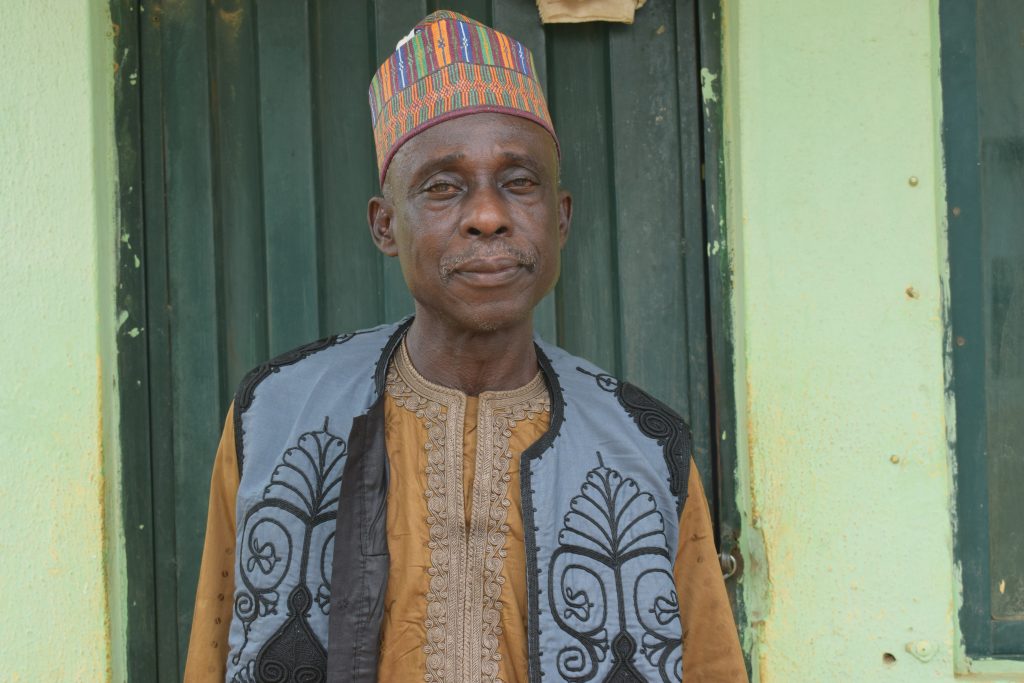In a world where deeply rooted traditions often collide with the rights of girls, one father dared to say “no.” His defiance of social norms in his community and state is a source of inspiration to us.
Muktar Umar Yakubu, a District Education Officer in Kaduna state, is one year away from retirement. He has become an unsung hero in his community for taking a firm stance against child, early, and forced marriage (CEFM). In a region where child marriage is a norm, and partly legal, as Shari’a law is in force, Muktar chose a different path for his daughters, a path paved with education, independence, and choice.
“I have seven children, three girls and four boys,” he says with pride. “Two of my daughters have graduated. The first is married to a doctor in America. The second is currently serving her NYSC in Kaduna State after studying botany. The last is finishing her National Diploma in nursing. Yes, I am going to have two medical professionals in my house.”
Muktar recounts an incident when a soldier’s family approached him, seeking the hand of his youngest daughter, while she was still in school. He didn’t hesitate. He said no to the proposal.
“I said, don’t you know she’s in school? I don’t give my children out if they are not educated,” he responded. “Had she graduated, and if she loved you, no problem. But as long as she is in school, allow her to finish.”
Muktar was firm. This conversation would not last long. Although the would-be suitor was forewarned, he decided to try his luck. Upon indicating interest in Muktar’s last daughter, somebody told him it was a waste of time. ‘’This man will not agree,” and they were right. Muktar’s resolve was unshakable.
Rather than provoke conflict, this interaction ended with laughter and admiration. The suitor, now inspired by Muktar’s firmness, will follow in his footsteps in due time.
“He said what I am doing, he is also going to practice the same thing.”
Muktar’s single act of resistance has had ripple effects far beyond his household.
The Power of One Father’s Voice
Growing up in Zaria, Muktar witnessed the brutal consequences of early marriage firsthand. He recalls seeing young women sitting outside Ahmadu Bello Teaching Hospital, unable to sit still, some suffering from fistula, a consequence of early childbirth.
“I asked someone what the problem was,” he said. “They told me it was an early marriage.” The women were too young for childbirth and did not have proper postpartum care.
From that moment, Muktar took it upon himself to educate his extended family and community. “I told them that early marriage is not good. These are the consequences.”
Today, because of his persistent advocacy, he proudly says, “In the whole area I live in, Zaria, nobody marries off their daughters without reaching the mature age.”
Muktar’s leadership is both personal and cultural. “I don’t force my daughters to marry somebody they don’t know,” he insists. “If they love the person after school, fine. If not, I won’t push.”
His approach is a rare but powerful blend of authority and empathy, deeply rooted in his faith and understanding of religious texts.
“Religion didn’t tell you to give your daughter out to marry without reaching the mature years,” he affirms. “Even now, imams are preaching in the mosques that daughters should not be given in marriage too early.”
He has seen that the change is tangible. “Almost 20 years ago, you would see women suffering due to early marriage. But now, go back to that hospital, you won’t see anyone like that again.”
This isn’t just a story about education; it is a story about defiance. A story about the quiet, consistent resistance of a father who refused to compromise on his daughters’ futures. Muktar’s story is not just one of personal triumph. It is a call to action for systemic change.
He believes that Islamic school teachers, village heads, and imams, the gatekeepers of cultural values, must be actively involved in this fight.
He believes that with education and sustained advocacy, early marriage can be stopped.”
His plea to government and civil society is simple but profound: invest in community education, leverage existing religious and educational structures, and provide support for men like him who are driving change from within.
“We believe in religion. And religion does not ask us to marry off children. If government and organisations support this cause, child marriage will drop, not by one or two per cent, but drastically.”
Ending Child Marriage Starts With Men Like Muktar
Muktar has shown us what courage looks like. He has taught us that true fatherhood means protecting dreams, not sacrificing them on the altar of tradition. His daughters are proof that when girls are allowed to learn, they lead, and when fathers stand by them, communities can be transformed.

